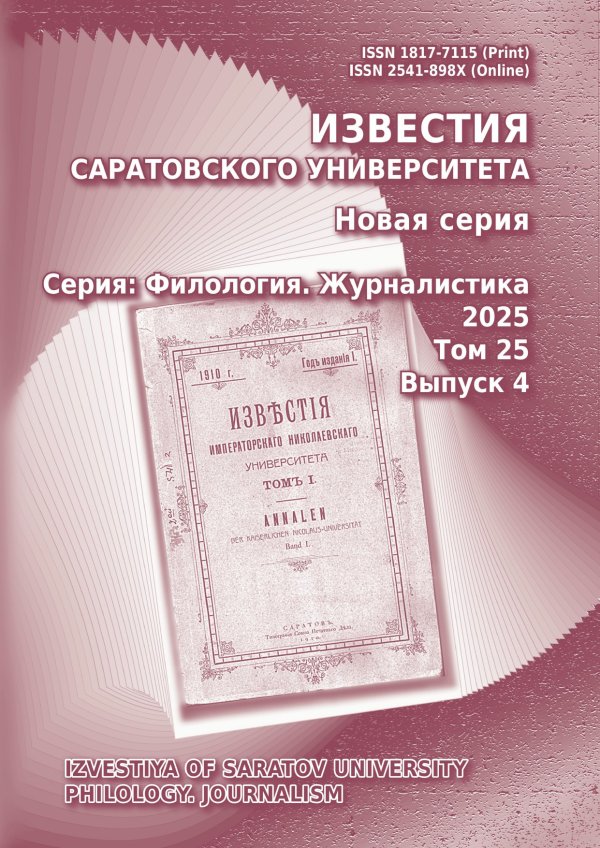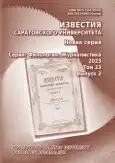Reflection of the strategic narrative of confrontation in non-governmental online media
- Authors: Agnistikova O.I.1
-
Affiliations:
- Kazan (Volga Region) Federal University
- Issue: Vol 23, No 2 (2023)
- Pages: 166-171
- Section: Articles
- URL: https://journal-vniispk.ru/1817-7115/article/view/251660
- DOI: https://doi.org/10.18500/1817-7115-2023-23-2-166-171
- EDN: https://elibrary.ru/GSRVPL
- ID: 251660
Cite item
Full Text
Abstract
The article deals with the problem of media displaying strategic narratives in the context of the domination of the antagonistic discourse in the relations between Russia and the West. The issue is becoming ever more urgent since the conflict component is being intensified on the global stage, which prompts the eagerness of a number of countries to impose their interpretation of what is happening as the only correct version, by means of promoting public agreement. On the example of several foreign online media the specific features of the narrative of confrontation are shown. Its structural elements are indicated, its particular properties are revealed. It is argued that the content of the constructed narrative is accusatory rhetoric, lying on the plane of foreign policy interstate relations. Several models of media representation of strategic narratives are characterized. The narrative of confrontation is revealed to have involved, besides the states and political leadership, people criticizing government, as the oppressed. It is emphasized that the main tool for constructing the narrative of confrontation is the use of discursive practices of constructing the “Other”, characterized by negative and evaluative semantics, which actualizes the image of the “alien” as an external enemy. Some topics are defined as the “framework” of the narrative in question; due to significant differences in the interpretation of events related to them, they sharpen the contradictions with the “Other” as with the discursive target. It was found that important conditions favorable to the functioning of the narrative of confrontation in the media are the elitist-official nature of the majority of news, as well as the declaration of the information war. It is concluded that the reliance on the same strategic narratives in journalistic materials acts as a factor of discursive limitation of the spectrum of evaluations of socially significant events, phenomena and processes, and the state of conflict of interpretations intensifies the antagonistic nature of the narratives broadcast in the media, activating the symbolic struggle between them for the exercise of discursive power.
About the authors
Olga I. Agnistikova
Kazan (Volga Region) Federal University
ORCID iD: 0000-0001-6228-2857
Russia, 420008, Kazan, Kremlevskaya street, 18
References
- Baumann M. “Propaganda Fights” and “Disinformation Campaigns”: The discourse on information warfare in Russia – West relations // Contemporary Politics. 2020. Vol. 26, iss. 3. P. 288–307. https://doi.org/10.1080/13569775.2020.1728612
- Федотова М. Г. Означивание социальной информации как фактор системной трансформации современного транзитивного общества : дис. ... д-ра филос. наук. Архангельск, 2016. 407 с.
- Hoffman L. H. Public Opinion in Context: A Multilevel Model of Media Effects on Perceptions of Public Opinion and Political Behavior : Diss. PhD. The Ohio State University, 2007. 190 p.
- Shamir J. Information Cues and Indicators of the Climate of Opinion: The Spiral of Silence Theory in the Intifada // Communication Research. 1995. Vol. 22. P. 24–53. https://doi.org/10.1177/009365095022001002
- Fields B. School Discipline Coverage in Australian Newspapers: Impact on Public Perceptions, Educational Decisions and Policy. 2006. URL: https://www.aare.edu.au/data/publications/2005/fie05290.pdf (дата обращения: 14.05.2022).
- Claessen E. The making of a narrative: The use of geopolitical othering in Russian strategic narratives during the Ukraine crisis // Media, War & Conflict. 2021. Vol. 16, iss. 1. https://doi.org/10.1177/17506352211029529
- Miskimmon A., O’Loughlin B., Roselle L. Strategic Narratives: Communication Power and the New World Order. New York : Routledge, 2013. 240 p. https://doi.org/10.4324/9781315871264
- Szostek J. Nothing is true? The credibility of news and conflicting narratives during “Information War” in Ukraine // The International Journal of Press/Politics. 2017. Vol. 23, iss. 1. P. 116–135. https://doi.org/10.1177/1940161217743258
- Grigor I. Weaponized News: Russian Television, Strategic Narratives and Conflict Reporting : Diss. Dr. Helsinki, 2020. 100 p.
- Miskimmon A., O’Loughlin B. Russia’s Narratives of Global Order: Great Power Legacies in a Polycentric World // Politics and Governance. 2017. Vol. 5, iss. 3. P. 111–120. https://doi.org/10.17645/pag.v5i3.1017
- Mattern J. B. Ordering International Politics: Identity, Crisis and Representational Force. London : Routledge, 2004. 320 p.
- Szostek J. The Power and Limits of Russia’s Strategic Narrative in Ukraine: The Role of Linkage // Perspectives on Politics. 2017. Vol. 15, iss. 2. P. 379–395. https://doi.org/10.1017/S153759271700007X
- Szostek J. News media repertoires and strategic narrative reception: A paradox of dis/belief in authoritarian Russia // New Media & Society. 2018. Vol. 20, iss. 1. P. 68–87. https://doi.org/10.1177/1461444816656638
- Oates S. Russian State Narrative in the Digital Age: Rewired Propaganda in Russian Television News Framing of Malaysia Airlines Flight 17 // Russian Politics. 2016. Vol. 1, iss. 4. P. 398–417. https://doi.org/10.1163/2451-8921-00104004
- Freedman L. The Transformation of Strategic Affairs. London : Routledge, 2006. 144 p.
- Somers M. R. The narrative constitution of identity: A relational and network approach // Theory and Society. 1994. Vol. 23. P. 605–649. https://doi.org/10.1007/BF00992905
- Deverell E., Wagnsson C., Olsson E.-K. Destruct, direct and suppress: Sputnik narratives on the Nordic countries // The Journal of International Communication. 2021. Vol. 27, iss. 1. P. 15–37. https://doi.org/10.1080/13216597.2020.1817122
- Погорелко А. М., Герасина Т. Н. Смысловые маркеры дискурса холодной войны // Политическая лингвистика. 2016. № 2. C. 93–101.
- Cel jest prosty, skłócić nas i pokazać jako bezdusznych. Mińsk i Moskwa z sytuacji na granicy czerpią garściami. URL: https://wiadomosci.gazeta.pl/wiadomosci/7,114883,27489346,cel-jest-prosty-sklocic-nas-i-pokazac-jako-bezdusznych-minsk.html (дата обращения: 14.05.2022).
- Polska prawica o „zdroworozsądkowej“ ideologii Putina. Krecia robota Kremla w ten sposób osiąga swoje cele. URL: https://wiadomosci.gazeta.pl/wiadomosci/7,114881,27767031,na-prawicy-dyskusje-nad-slusznoscia-ideologii-putina-wioska.html (дата обращения: 14.05.2022).
- Магун А. В., Микиртумов И. Б., Пархоменко А. А. Нарратив и аффект в анализе внешнеполитической риторики // Вестник Томского государственного университета. Философия. Социология. Политология. 2020. № 57. С. 60–73. https://doi.org/10.17223/1998863X/57/7
- Putino administracijoje dirbęs Andrejus A. Kovaliovas: „Aš pamačiau neapsiskaičiusį, neišsilavinusį, neįtikėtinai cinišką žmogų“. URL: https://www.15min.lt/naujiena/aktualu/pasaulis/putino-administracijoje-dirbes-andrejus-a-kovaliovas-as-pamaciau-neapsiskaiciusi-neissilavinusi-neitiketinai-ciniska-zmogu-57-978868 (дата обращения: 14.05.2022).
- Mathisen B. R. Sourcing Practice in Local Media: Diversity and Media Shadows. URL: https://www.tandfonline.com/doi/full/10.1080/17512786.2021.1942147 (дата обращения: 14.05.2022).
- Rusija pagrasino kariniu atsaku į NATO plėtrą. URL: https://www.15min.lt/naujiena/aktualu/pasaulis/rusija-pagrasino-kariniu-atsaku-i-nato-pletra-57-1613092 (дата обращения: 14.05.2022).
- Автохутдинова О. Ф. «Другой» как персонаж в СМИ: дискурсивные практики конструирования : автореф. дис. ... канд. филол. наук. Екатеринбург, 2015. 29 с.
- Ukrajina je v očích Putina ženou, která utekla z harému, říká ruský filmař Manskij. URL: https://zpravy.aktualne.cz/zahranici/vitalij-manskij-rusko/r~868e94003b0a11ec8fa20cc47ab5f122/ (дата обращения: 14.05.2022).
- Andrzej Duda reaguje na likwidację Memoriału. „Sumienia nie da się zdusić“. URL: https://wiadomosci.gazeta.pl/wiadomosci/7,114883,27954373,andrzej-duda-o-likwidacji-memorialu-sumienia-nie-da-sie-ani.html (дата обращения: 14.05.2022).
- Europos Parlamentas: Rusija yra pagrindinė dezinformacijos Europoje skleidėja. URL: https://www.15min.lt/naujiena/aktualu/pasaulis/europos-parlamentas-rusija-yra-pagrindine-dezinformacijos-europoje-skleideja-57-1115382 (дата обращения: 14.05.2022).
- Rusija aktyviau atakuoja informacinę erdvę, tačiau Kremliumi tiki vis mažiau Lietuvos piliečių. URL: https://www.15min.lt/naujiena/aktualu/lietuva/a-56499788 (дата обращения: 14.05.2022).
- „NYTimes“: Rusija gniaužia prisiminimus apie gulagą. URL: https://www.15min.lt/naujiena/aktualu/pasaulis/ny-times-rusija-gniauzia-prisiminimus-apie-gulaga-koks-bus-memorial-likimas-57-1602068 (дата обращения: 14.05.2022).
- Rusus į gatves išvedė ne tik A. Navalnas, o Baltarusijos scenarijus nebūtinai pasikartos. URL: https://www.15min.lt/naujiena/aktualu/pasaulis/rusus-i-gatves-isvede-ne-tik-a-navalnas-baltarusijos-scenarijus-nebutinai-pasikartos-57-1444806 (дата обращения: 14.05.2022).
- Hinck R. S., Kluver R., Cooley S. Russia re-envisions the world: Strategic narratives in Russian broadcast and news media during 2015 // Russian Journal of Communication. 2018. Vol. 10, № 1. P. 21–37. https://doi.org/10.1080/19409419.2017.1421096
- Dimitrova D. V., Kaid L. L., Williams A. P., Trammell K. D. War on the Web The immediate news framing of Gulf War II // The International Journal of Press/Politics. 2005. Vol. 10, iss 1. P. 22–44. https://doi.org/10.1177/1081180X05275595
- Плахина И. Е., Белякова Т. В. Бег по кругу: риторика холодной войны в современной российской и американской прессе // Quaestio Rossica. 2016. Т. 4, № 2. С. 159–180.
- Dimitriu G., De Graaf B. Fighting the War at Home: Strategic Narratives, Elite Responsiveness, and the Dutch Mission in Afghanistan, 2006–2010 // Foreign Policy Analysis. 2016. Vol. 12, iss. 1. P. 2–23.
Supplementary files










